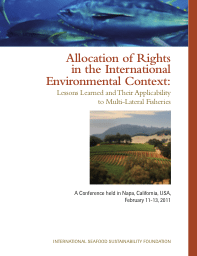Document: ISSF 2011-11A: Allocation of Rights in the International Environmental Context. Napa Conference, Feb 2011
“Lessons Learned And Their Applicability To Multi-Lateral Fisheries”
In May 2010, ISSF sponsored the Bellagio Conference on Sustainable Tuna Fisheries. The Bellagio Conference highlighted three pillars of sustainable global tuna fisheries (control of fishing capacity, allocations and rights-based management and effective monitoring, control and surveillance (MCS) measures) and developed the “Bellagio Framework” to inform and guide efforts to address these issues at the global level. The Bellagio Framework highlights that international fisheries for tunas, billfish and other highly migratory species are at a critical juncture, and that urgent action is required to control and reduce fishing capacity and to allocate these shared resources in an efficient, effective and equitable manner.
The Napa Conference on Allocation was held to further develop and refine approaches to one of the three Bellagio pillars: Successful allocation of rights. The workshop convened a number of multi-disciplinary experts from academia, international organizations, non-governmental organizations and Governments of both developed and developing countries in order to draw from experiences in fields such as water, atmosphere, energy, fisheries and other complex environmental negotiations.
Conference participants shared their experiences and examined some of the major challenges faced in the multilateral tuna fisheries context and concluded that successful allocations require five key actions to be undertaken.
Downloads: 846 | Views: 2
